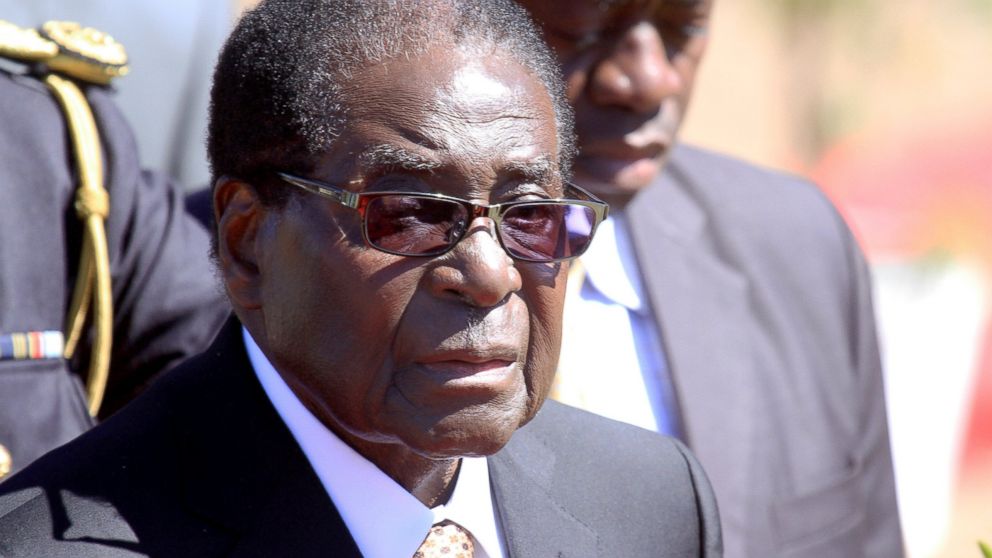World Health Organization rescinds Zimbabwean President Robert Mugabe's 'goodwill ambassador' appointment amid scathing criticism
The World Health Organization revoked the appointment amid scathing criticism.

— -- The World Health Organization (WHO) rescinded its appointment of Zimbabwean President Robert Mugabe as a "goodwill ambassador" for health after days of searing criticism and global outcry over the decision.
The WHO's director general, Tedros Adhanom Ghebreyesus, said in a statement today he decided to revoke Mugabe's role after he had "reflected" on the controversial appointment.
"I have listened carefully to all who have expressed their concerns, and heard the different issues that they have raised,” he said. “I have also consulted with the government of Zimbabwe and we have concluded that this decision is in the best interests of the World Health Organization. I thank everyone who has voiced their concerns and shared their thoughts."
Tedros, a former Ethiopian official who this year became the first African to lead the United Nations' health agency, told a global conference in Uruguay on noncommunicable diseases (NCD) last week that he was “honored” to be joined by Mugabe and praised Zimbabwe as "a country that places universal health coverage and health promotion at the center of its policies to provide health care to all."
"I am also honored to announce that President Mugabe has agreed to serve as a goodwill ambassador on NCDs for Africa to influence his peers in his region to prioritize NCDs," Tedros said at Wednesday's global conference.
The announcement drew swift reaction around the world that ranged from utter confusion to downright outrage because of the longtime leader's track record of human rights abuses, including brutal crackdowns on political dissent, which has resulted in international sanctions against Zimbabwe.
UN Watch, a Swiss human rights group that monitors the performance of the United Nations, issued a statement Thursday expressing "grave concern" over Mugabe's appointment.
“The government of Robert Mugabe has brutalized human rights activists, crushed democracy dissidents, and turned the breadbasket of Africa — and its health system — into a basket-case. The notion that the U.N. should now spin this country as a great supporter of health is, frankly, sickening,” UN Watch executive director Hillel Neuer said in the statement. “Amid reports of ongoing human rights abuses, the tyrant of Zimbabwe is the last person who should be legitimized by a U.N. position of any kind."
Iain Levine, the deputy executive program director at Human Rights Watch, wrote on Twitter Friday, “Given Mugabe’s appalling human rights record, calling him a goodwill ambassador for anything embarrasses [WHO] and [Tedros].”
The NCD Alliance, which works with the WHO and other groups to fight noncommunicable diseases around the world, released a statement Friday signed by 31 other organizations saying Mugabe's appointment "cannot be justified."
"Members of the NCD civil society movement present at the conference are shocked and deeply concerned to hear of this appointment, given President Mugabe’s long track record of human rights violations and undermining the dignity of human beings," the NCD Alliance said in the statement. "While we support WHO and Dr. Tedros in their ambition to drive the NCD agenda forward, we are unable to recognize President Mugabe as a champion for NCDs."
In a statement to The Associated Press, the U.S. Department of State called the appointment “disappointing.”
“This appointment clearly contradicts the United Nations ideals of respect for human rights and human dignity,” the department said.
Mugabe, 93, has led Zimbabwe since the country's independence in 1980, making him the world's oldest head of state. Despite his age and concerns over his health, Mugabe has showed no signs of relinquishing his grip over the southern African nation.
Zimbabwe's ruling party has confirmed Mugabe as its sole candidate for next year's election.
Citing the Zimbabwean government's human rights abuses and evidence of rigged elections, the United States in 2003 imposed targeted sanctions, a travel ban and an asset freeze against Mugabe and his close associates.




